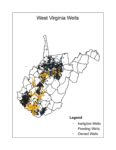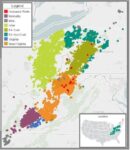Residences and businesses in cities receive natural gas from lines owned by distribution
companies. Those distribution companies get their gas from transmission lines. The transmissions lines get their gas from gathering lines that are attached to the gas wells. Many rural residences and businesses in areas where gas wells are located also receive natural gas supplied not from distribution lines, but from gathering lines and sometimes smaller transmissions lines. This explanation is a little bit of an oversimplification.
However, for discussion we will call those “field taps”. (Others get so called “free gas” directly from well heads or indirectly from the smallest gathering lines near the wells from which they could get the “free gas”. This issue is NOT about “free gas”.)
Some companies have so many field taps on their lines that their service has ended up being regulated by the Public Service Commission. The PSC regulates rates and whether the services for individual customers from these farm taps can be discontinued, and if so, on what terms. These field taps on gathering lines get their gas from existing, conventional, vertical wells. The Marcellus Shale horizontal drilling tsunami is indirectly causing problems with the provision of gas at these field taps. Horizontal Marcellus wells produce much larger volumes of gas, and at much higher pressures. And the only produce it in the northwest part of our state (so far). And their increased efficiency at producing gas has driven down the wholesale price of gas. And drillers never did like
providing these field taps much, and the problems associated with it are even bigger for the Marcellus drillers.
But the biggest problem is that these existing, conventional, vertical wells are getting old. As wells get old they produce less and less and less and less pressure. In the past this was mostly dealt with by the drilling of new vertical wells to supply the lines that supplied field taps. However, only Marcellus, horizontal wells are getting drilled now, and especially in the northwest parts of the State. So new conventional wells that could supply these field taps are not being drilled as the old ones fade
Now the Public Service Commission is doing an investigation of this problem and what can be done. Many of the gas companies as well as the Independent Oil and Gas Association (IOGA) have comments. Public comment is invited. WVSORO did file a comment with the PSC.
Using propane instead is said to be as expensive plus conversion costs. Electric heat is also said to be more expensive. It may be possible to link lines in some places to new transmission lines. It may be possible to drill new wells, but that has a high up front capital cost that needs financed somehow.
HB 2661 in the 2019 Legislature would have allowed the companies supplying field taps to boost their rates in order to help finance the drilling of new wells. Unfortunately it was vetoed by the Governor.
To date it is our position that each individual situation needs dealt with separately.








